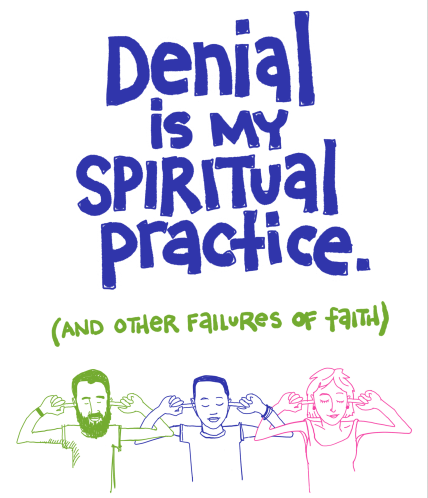Denial is my spiritual practice (and other failures of faith),
Rachel G Hackenberg & Martha Spong (Church Publishing, May 2018)
In her epilogue to the book, Rachel writes*
Our best hope is not that you read these stories and say, “Wow, cool dirty laundry,” but that you find a mirror for your spirit somewhere within these pages, a glimmer of a reflection to assure you that you’re not alone – in faith or in life, in pain or in change – and that you recognize yourself within God’s broader story.
I had already marked the page where Martha described arriving for a coffee date:
Once inside, I listened carefully to the orders of the people in line ahead of me, managed to request a cup of coffee without sounding inept …
because I do so recognize that grown woman covering her adolescent anxiety about fitting in with careful tactics designed to demonstrate competency. I saw her in the mirror on her way out of my house this morning.
The gift that Martha and Rachel offer in their stories is not found in the information about their lives per se, fascinating and generous as they are, but in that invitation to the reader to find herself (himself, themself) within the stories that we share; the ones that haunt us since our days growing up within or without families, within or without the embrace of our spiritual ancestors, whose stories creep out of the Bible to interweave with these pastors’ words and remind us that it was ever thus, and that God was ever so.
In the years between moving to America and becoming an Episcopal priest, through a series of associations I won’t go into here, “The Summons,” that beautiful song by John Bell of Iona has become my mantra of sorts; my theme song. One verse opens, Will you love the “you” you hide if I but call your name? The song kept singing itself to me as I read these women’s words. In a way, they are asking the same question, and laying their own struggle to answer it on the table.
Rachel’s writing style has the texture of that brittle shell that we cast around those parts of ourselves we most need to protect, even from ourselves, even from God; its touch unmasks the truthfulness of her storytelling, the depth of her honesty, the leap of faith it takes to put down on paper the prayer that names the fear,
Unless
God doesn’t come.
Martha’s writing opens a well for the reader to dip her pen (his, their pen) and write themselves into the story, write their own story. The conversation between the two, indirect, yet lilting, like songs answering each other across a fence, brings the reader home.
I’m not sure when a book last sang to me.
I recommend that you acquire yourself a copy, read it, savour it, and then keep it close for those moments when, for the sake of faith or sanity, you need once more to find yourself reflected in the mirror of another soul, another spirit, one that has wrestled with God, and, against all expectations, lived to see dawn’s light limping across the valley.
***
- By way of disclosure: I’ve met Rachel; Martha, too, online at least, and in print in the RevGalBlogPals book, There’s a Woman in the Pulpit (SkyLight Paths Publishing, 2015), which Martha compiled and edited, and to which we all contributed, me least of all.
- Get the book from Church Publishing, on Amazon, or talk to your favourite independent book seller.
Rosalind Hughes is Rector of the Church of the Epiphany in Euclid, OH and a contributing editor here at the Episcopal Cafe. Her personal blog is Over the Water.

